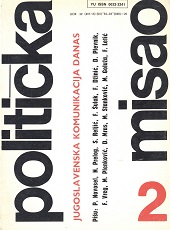Duhovne znanosti i praktična filozofija u djelu Joachima Rittera
The Humanities and Practical Philosophy in the Work of Joachim Ritter
Author(s): Ante PažaninSubject(s): Education, Metaphysics, Ethics / Practical Philosophy, Political Philosophy, Political Sciences
Published by: Fakultet političkih znanosti u Zagrebu
Keywords: Humanities; Practical Philosophy; Joachim Ritter;
Summary/Abstract: Ritter's thought that individual sciences cannot take over the role once played by philosophy and metaphysics is seen to be correct on the example of the university and of education in modern society. For this task can be fulfilled today only by the humanities,. Modern industrial society produces these discipline as an "organ" of the spiritual compensation for its own "abstraction and ahistoricity". Following the example of Hegel, who mediated a unity of the substantiality of antiquity and the subjectivity of the modern era and thus solved the problem of the "split" (Entzweiung) of the past and the present, Ritter, with the help of the humanities, tries to maintain and, in modern technical society, to keep alive the pre - modern historical forms and values of life, which technical production destroys and leaves behind. These forms and values were earlier cultivated through philosophy, law, politics, art, etc. Therefore, the humanities assume the role of classical supreme theory and practical philosophy as well as the role of modern hermeneutic philosophy of an and that of the understanding of the historical life world. They study and give sense to the varied forms of the historical realizing of the spirit in those areas of human life that cannot be reduced to natural and technical sciences nor understood with their help. Although they came into being later then the modern experimental natural sciences the humanities are also modern disciplines. Indeed, they are the response to the challenge of modern technology. Therefore, not only are the humanities not unnecessary in modem society, they are indispensible; for they help man to endure all modernization and thus they make modernization itself possible. In this sense, Ritter's former pupils, primarily Odo Marquand and Hermann Lübbe, revive Ritter's thought about compensation and develop the thesis about the inevitability of the humanities (Geisteswissenschaften) as "narrative sciences" (erzählende Wissenschaften). In the historical life world, namely, by "narrating" we do not only develop the aesthetic sense for the beautiful and the historical sense for the past and the future, but also our orientation in the world towards responsible moral and political action.
Journal: Politička Misao
- Issue Year: XXIV/1987
- Issue No: 02
- Page Range: 118-134
- Page Count: 17
- Language: Croatian

